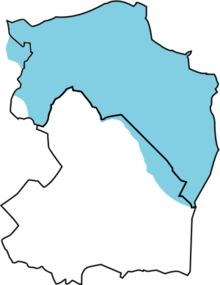Gronings
| Gronings | |
|---|---|
| Grunnegs or Grönnegs | |
| Native to | Netherlands: Groningen, parts in the north and east of Drenthe, the east of the Frisian municipality Kollumerland en Nieuwkruisland |
| Region | Groningen |
|
Native speakers
|
590,000 (2003) |
| Official status | |
|
Official language in
|
the Netherlands (as part of Low Saxon) |
| Language codes | |
| ISO 639-3 | |
| Glottolog | gron1242 |

|
|
Gronings (Dutch pronunciation: [ˈɣroːnɪŋs]), in the dialect itself called Grunnegs or Grönnegs, is a collective name for some Friso-Saxon dialects spoken in the province of Groningen and around the Groningen border in Drenthe and Friesland. Gronings and the strongly related varieties in East Frisia have a strong Frisian influence and take a remarkable position within West Low German. The dialect is characterized by a typical accent and vocabulary, which differ strongly from the other Low Saxon dialects.
The name Gronings can almost be defined geographically, as can be seen on the map below. This is especially true for the northern part of Drenthe (number 8 on that map). The Drents, spoken in the north of the province of Drenthe (Noordenveld) is somewhat related with the Groninger language, but the core linguistics is Drents. For the dialects in the southeast, called Veenkoloniaals, it's a bit different on both sides of the Groningen-Drenthe border, as the dialect spoken there is much more related to Gronings. In the Frisian municipality of Kollumerland en Nieuwkruisland, the western dialect called Westerkwartiers is also spoken, as well as a separate Groningen dialect called Kollumerpompsters. The latter is spoken in the Frisian village of Kollumerpomp and has more West Frisian influences, while most Groningen dialects have a strong influence from the Saterland Frisian language.
The Gronings language can be subdivided into 8 dialects:
Though there are several differences between the dialects, they form a single dialect group. Most words are written the same way, but the pronunciation can differ. The examples show the pronunciation.
...
Wikipedia
